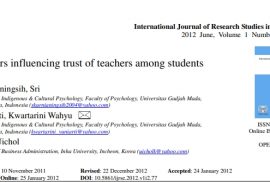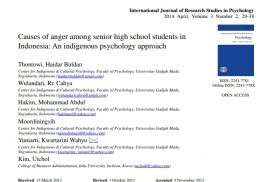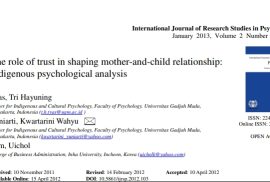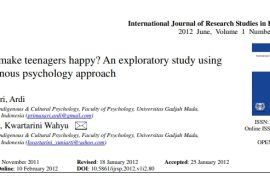ABSTRACT. In Indonesia, Ki Hajar Dewantoro is one of the most respected scholars in education philosophy. He stated the importance of trust earned by teachers in guiding students in their learning activities. The teacher, as the leader in the class, needs to develop mutual trust between students and teachers. Trust to teachers is strongly required by students as a foundation in developing and expanding their relationship and also social network. It is also the fundamental element in their desire to pursue higher education, for it is only through a sense of trust that student will embrace an empowering sense of freedom and pursuit the knowledge. The exercise of this freedom requires a risk on behalf of students based on the trust of their teachers and the learning experience that they provide. If students trust their teachers, they will be more able to focus on the task at hand and to work and learn more effectively. A total number of 291 senior high school students in Yogyakarta (males=147, females=144) completed an open-ended questionnaire developed for this study that asks how much they trust their teachers and the reason why they trust their teachers. The data was analyzed using indigenous psychological approach of analyzing the content of open-ended responses, categorization of the responses and cross-tabulating with demographic/background information. Results indicated that 63% of participants stated that they trusted their teachers. The main reason for trusting their teachers are as follows: they are perceived as being similar to their parents, teachers’ ability in transferring knowledge, the relationship with teacher, and their abilities of guiding students. The study concluded that trust of senior high school students was established because of views that teachers are parents that have competence in delivering knowledge and are formally established as teachers. Therefore a teacher’s behavior that similarly represents a parent’s behavior at home will produce a child’s trust and this will become the foundation for the students to learn better.
Journal Articles
ABSTRACT. Appraisal theorists have argued that anger is elicited when important goals have been obstructed. Using an indigenous psychology approach, the current study aims to test this premise by investigating the events that account for a person’s anger among Indonesian senior high school students. Data was collected using the anger item from the Happiness open-ended questionnaire, asking about events that make the subjects’ most angry. A total of 425 senior high school students consisting of 171 males and 254 females were involved in the study. The data was analyzed using an indigenous psychological approach by analyzing the content of the open-ended responses, categorization of the responses, and cross-tabulations with the respondent’s sex. The findings suggest that Indonesian senior high school students become angry when they their trust has been violated, insulted, encounter an unpleasant experience, and disturbance. Further analysis was conducted to identify variability upon male and female subjects. The chi square test that was run towards the variables events for causing anger and sex indicated a significant relationship (p<0.03). Male respondents were most likely to become angry when encountering unpleasant experiences while females were most likely to become angry when their trust has been violated. The findings are contrary to the notions that goal obstruction is central in eliciting anger.
ABSTRACT. The purpose of this study was to examine the role trust plays in shaping the parent-child relation and the reasons why children trust and distrust their mother. A total number of 507 university students (males= 140, females=367) at the Universitas Gadjah Mada completed an open-ended questionnaire that asked how much they trust their mothers and the reason why they trust and distrust their mothers. The data was analyzed using indigenous psychological approach of analyzing the content of open-ended responses, categorization of the responses, and cross tabulating. Result from these study shows that 57.63% of participants’ trust their mothers to a great extent and 33.69% of respondents largely trust their mothers. Second, there are five main categories of reasons for trusting mothers and six main categories of reasons for distrusting their mothers that have emerged. First category focuses on mother’s personal quality such as honesty and reliability. Second, what mothers are able to bring into the life being that involved mother critical role for children surviving the world, physically, psychologically, and socially. Third, what exist between the relations counts the trust existence. Fourth, the perceived figure of mother. Fifth, the role of self in deciding when to trust. The six categories for distrust suggest the unconditional trust toward mother that indicate the strong bend of trust-relation between mother and children once it is established. It reaches to the conclusion that reasons for trusting mother is much colored by the spiritual and emotional nuance, whereas honesty and reliability, empathy, give the best, closeness and consanguinity, are factors that play quite important role in the development or establishment of trust to mother. From the reasons of trust and distrust, we learned that trust can play as the modality to consider act or to relate and as a product or result and is dynamic rather than static.
ABSTRACT. The aim of this research was to explore what make teenagers happy. The study was a survey on the total number of 467 high school students (males=198, females=269). An open ended questionnaire was used to learn what makes teenager happy. The data was analyzed using indigenous psychological approach. Preliminary coding, categorization, axial coding and cross-tabulation were run accordingly. The respondents’ answers were analyzed using descriptive analysis. Results showed that there were three elements of the source of teenager’s happiness, those are: (1) relations with others (50.1%) consisting of events concerning their families, relations with friends, and events related to love and being loved; (2) Self-fulfillment (32.67%) consists of events related to achievement, the use of leisure time, and money; (3) Relation with God (9.63%) consists of spiritual events that involve the relations between teenagers and God. This study gave the insight that family-bond remain importance. Their being teenagers does not shift the reference into peer groups, rather than that, family is the main source of their happiness. It is also concluded that all are nothing but social engagement.




